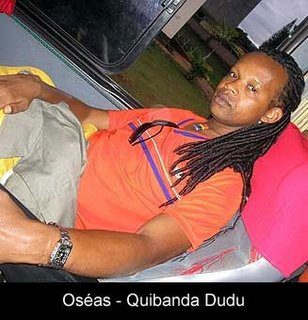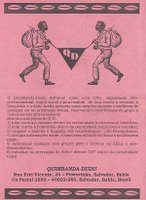An Interview with Oséas Santana, President of Quibanda Dudu, Salvador, Bahia, Brazil
 For nearly two decades, Oséas Santana has been engaged in activism on behalf of Black lesbians, gays, bisexuals and transgender people in his native Bahia, Brazil. In addition to working with Grupo Gay da Bahia (GGB), the groundbreaking LGBT and human rights organization headquartered in the historic and picturesque Pelourinho district of Bahia's capital city, Salvador, Santana has also been the president of Quibanda Dudu, an organization that works specifically to raise the consciousness, self-esteem, racial and ethnic pride, and solidarity of Bahia's largely African-descended LGBT population. A few months ago, I had the pleasure of conducting an online interview with Oséas, and learned more about the important work he and QD are doing. (Many thanks to Marccelus Bragg, who facilitated the interview, and from whose site I've borrowed the pictures. Also, a slightly different version of the interview, in Portuguese, can be found here. For those interested in GGB, my interview with its president, Marcelo Cerqueira, is available here.)
For nearly two decades, Oséas Santana has been engaged in activism on behalf of Black lesbians, gays, bisexuals and transgender people in his native Bahia, Brazil. In addition to working with Grupo Gay da Bahia (GGB), the groundbreaking LGBT and human rights organization headquartered in the historic and picturesque Pelourinho district of Bahia's capital city, Salvador, Santana has also been the president of Quibanda Dudu, an organization that works specifically to raise the consciousness, self-esteem, racial and ethnic pride, and solidarity of Bahia's largely African-descended LGBT population. A few months ago, I had the pleasure of conducting an online interview with Oséas, and learned more about the important work he and QD are doing. (Many thanks to Marccelus Bragg, who facilitated the interview, and from whose site I've borrowed the pictures. Also, a slightly different version of the interview, in Portuguese, can be found here. For those interested in GGB, my interview with its president, Marcelo Cerqueira, is available here.)Q: Where are you from? Please tell me about yourself.
A: I am a black man of humble origins like so many other Bahians. I am from Salvador; I was born on its periphery, and I created myself, at urban feasts of hate and racism against poor blacks and those who've been utterly stripped of power.
Q. You told me that you'd fought for a while against racism and homophobia. Where and when did you begin your work?
A: I've been battling for sixteen years against racism. I find that racial inequality represents a terrible evil. In the beginning I joined with my neighbors, blacks and people without money—claiming a house to live and a spot on a public lot to construct a shack. The battle for a basic dwelling is a constant issue for a large part of the Brazilian population, and from early on, I' ve always been engaged in movements for basic human rights. One day I learned about Grupo Gay da Bahia and I felt complete. It was under the aegis of GGB that I grew as a militant activist. It was there that I learned and I read a lot about black gay consciousness. Then one day I decided with other black homosexuals to found Quibanda Dudu.
Q: What does the name of your organization, Quibanda Dudu (also Quimbanda-Dudu [QD]), mean?
A: QD means: "Quibanda" comes from the Angolan language and means spirit worker or sorcerer, and "Dudu" comes from the Nigerian Keto and means Black; the combination of these two words reflects the positive magic that exists in the condition of being black. It's a golden kind of beauty, of pride, and of pleasure in being black and homosexual. Our patron is Francisco Manicongo, an African slave and Quibanda himself, who was denounced by the Inquisition in 1591 as a "sodomite," for refusing to dress in a man's clothes.
Q: What is the role of ancestors in QD's work?
A: Ancestry is an essential reference in QD's creation. We are for the observation of rites, and for good examples that bequeath the black race to us in all its dimensions. A race which doesn’t understand or hold its past in prestige doesn't have any value in the present, and won't represent much of anything in the future. We are for the preservation of our "ancestral deeds and existence" and we treat this as if it were a mission. The black person has to have pride in his origins and in his secular symbols.
Q: When did you become involved in QD?
A: I began to become active in GGB under the inspiration of the anthropologist Luiz Mott (the founder of GGB). I resolved to create QD because we wanted the particularities of our struggle be heard and addressed within GGB. Then I brought together black people disposed to the struggle and to showing their faces in public, and we went into the streets. I am QD in my soul. And my soul is black because the color black is marvelous, and behind it lies its divinity.
Q: How does QD serve the LGBT communities of Bahia? How does your organization work with other groups (like GGB, for example)?
A: QD is an organization that meets every week and discusses themes related to discrimination and homophobia. We are interacting with other organizations, like the Movimento Negro Unificado (Black United Movement); with GGB, which provides us space in their headquarters in the Pelourinho; and with diverse other organizations who fight for human rights. In political campaigns QD champions and urges that blacks vote and choose other blacks for public offices. Homosexuality is a positive factor, a good thing in the life of blacks who come out, and so getting them to care for their health also is one of QD's thrusts. For this reason also we have meetings to raise consciousness against the spread and transmission of STDs/AIDS and we distribute condoms.
Being black and gay in Bahia with QD is being comfortable and well with yourself.
 Q: [Thanks to author Valdeck Almeida de Jesus] I've received some issues of the Quibanda Dudu Bulletin and greatly enjoyed. In them I find a mixture of articles (like one about the famous author Mario de Andrade), news and other kinds of pieces. How do you select the contents for each issue?
Q: [Thanks to author Valdeck Almeida de Jesus] I've received some issues of the Quibanda Dudu Bulletin and greatly enjoyed. In them I find a mixture of articles (like one about the famous author Mario de Andrade), news and other kinds of pieces. How do you select the contents for each issue?A: The choice of contents for the QD Bulletin is a democratic act. Our magazine QDB is a simple publication, appears every three months and is without great editorial merit because we don't have money to gather photos or issue larger printings or print on a better quality of paper. We editors are really just a few black volunteers of QD who operate in kind of a student culture; we are poor and we don't have money to bankroll the costs of the Bulletin. But even still, our message in the magazine is activism. There is always material about racial segregation, about gays who succeed and who are productive (we need to show black gays who've achieved good things), we denounce the killing of black homosexuals, whose crimes go unpunished, etc. We meet and discuss what topics are going to be part of the Bulletin; after the approval of themes, we send it to be written up.
Q: What are the social and cultural effects of QD? How do you believe the organization has changed black LGBT consciousness in Bahia and Brazil?
A: Changing the mentality of the black Third World homosexual is difficult to do in a short period of time. Of course there were centuries of massacre and slavery. But QD has been forced to create self-esteem and self-worth. We are always repeating: Being a black gay person is healthy. Don't let yourself be humiliated and don't be sad about injustices; always respond to them and love yourself. I am certain that QB has helped many poor and marginalized kids to free themselves from feelings of blame about being gay to experience some happiness in living as black and homosexual.
Q: In your opinion, how do Afro-Brazilian cultural and political groups react to Afro-Brazilian gays? Are QD and other groups changing the consciousness of Black people in the state and across the country on the question of Afro-Brazilian gays?
A: We don't have money or opportunities to do much work, but we have the respect of other organizations. At the national level and alongside other organizations in Brazil's gay rights movement, QD was one of the groups of black gays who fought for quotas ensuring the black race's participation in all the social movements. We have an obvious interest in movements pushing for free sexual expression and those that are more on the left side of the political spectrum; our affinity is with those who fight for social justice. QD is an organization of blacks and black homosexuals that is proud of its fights and values each victory.
 Q: How do you find LGBT life in Bahia now, and how does it differ for Afro-Bahians?
Q: How do you find LGBT life in Bahia now, and how does it differ for Afro-Bahians?A: Bahia is beautiful. It's a marvelous place for tourists. For anyone who comes in search of easy sex it's a paradise here. Unfortunately Salvador is an injust and cruel city for its black children. Injustice exists. Black homosexuals are discriminated against. During Carnaval, in the afoxés and in the streets black gay men are beautiful and marvelous; in the rest of the year, they pass by unnoticed. There is a white and powerful Bahia that does not lower itself to deal with the large part of the population that's black. Not everything is happiness and pleasure, then, for the black gay people of Bahia. There is pain and suffering also. Many black gays are assassinated. Many black transvestites are exploited and AIDS is still greater in the Black population.
Q: What do you feel is QD's legacy?
A: The legacy of Quibanda Dudu and the message that we leave people with is self-esteem. The black gay Bahian is polite, lovable, happy, and friendly. But he's suffering also. The majority are poor folks who're only surviving. QD works with homosexuals from the margins, with people at the bottom. We need the help and support of our black foreign brothers. We invite you to visit Brazil, to come to Salvador to see our reality and help us. We need a headquarters, a house to hold our meetings, and condoms and informative materials. So we welcome your visit and support for our work.
***
If you would like to contact with Quibanda Dudu:
Oséas Santana, Presidente do Quibanda Dudu
QUIBANDA DUDU
Rua Frei Vicente n. 24 _ Pelourinho
Salvador Bahia _ Cep: 40022 260
BRASIL
Email: Oseasggb@yahoo.com.br









No comments:
Post a Comment